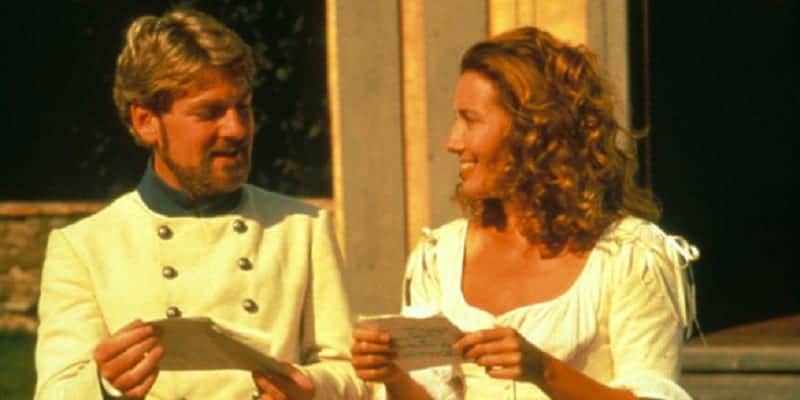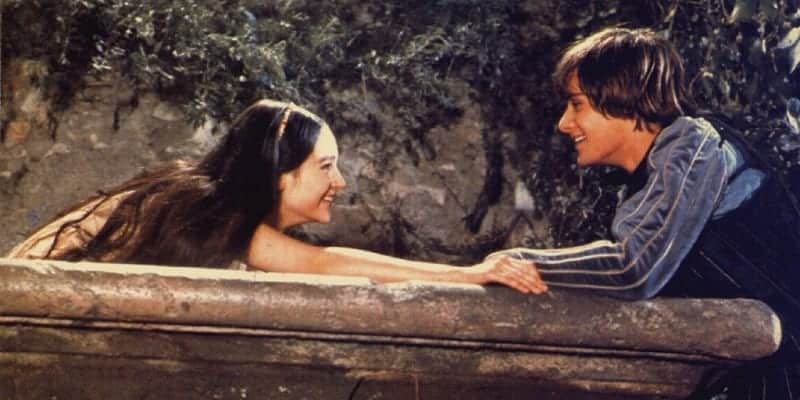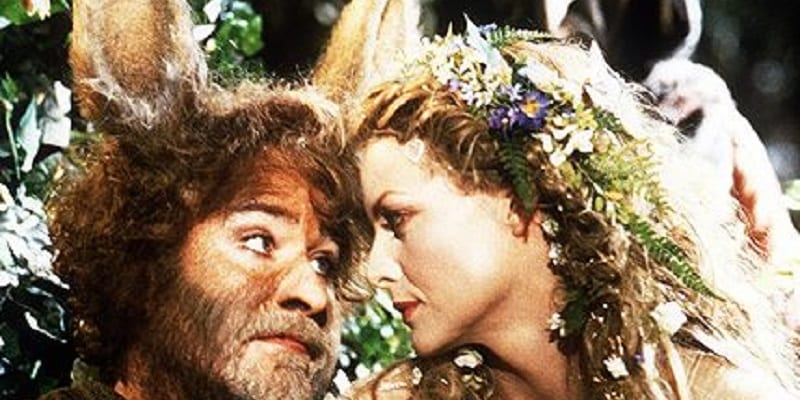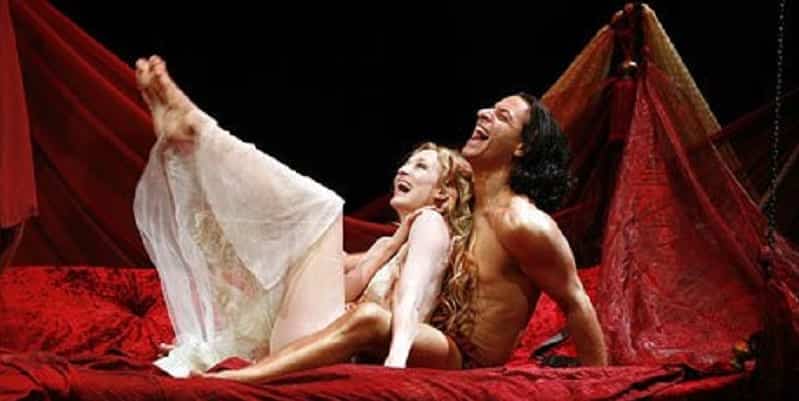Shakespeare in renown for creating some of the world’s top lovers. In this post, we take a look at Shakespeare’s top love scenes across all of his plays. So, in no particular order here are Shakespeare’s top 10 love scenes:
Much Ado About Nothing, Act 4, Scene 1
A quarrelsome duo discover they don’t hate each other
Top quote: “I do love nothing in the world so well as you” (Benedick)
Former foes Beatrice and Benedick have been conned into believing they adore each other, and now he openly admits that he does. She’d clearly reciprocate but for the crisis that has just brought them together. Her cousin Hero has been wrongly accused of promiscuity and cruelly abandoned at the altar by her prospective husband. Although Beatrice’s heart is won, her blood is up. “Kill Claudio,” she demands, adding that she herself wishes to eat his innards in the marketplace. And, unwillingly Benedick consents to what is a test of his devotion. They’re still in a church unsurprisingly emptied of all of the wedding guests except them. It’s a pretty strange setting and situation for a love scene, but nowhere else in Shakespeare is there a better prospect of a mature, lasting marriage.

Kennth Branagh & Emma Thompson in Branagh’s 1993 adaption of Much Ado About Nothing
As You Like It, Act 4, Scene 1
Frolics, love games and cross-dressing in the Forest of Arden
Top quote: “…that thou didst know how many fathom deep I am in love!” (Rosalind)
Here’s an almost more unconventional love scene. An environmentally reckless Orlando – he has been ruining trees by caving her name on them – is and isn’t courting Rosalind. The confusion is because Shakespeare’s virtuoso gender-bending meant that a boy-actor would have been playing a girl disguised as a boy pretending to be a girl. Yet whoever now takes the two roles, they should be packing the scene with half-suppressed sensuality and longing. “Woo me, woo me,” demands Rosalind. “Love me, Rosalind,” says Orlando, capitulating to the seeming deception. However, as she then admits to her reproachful friend Celia, she has capitulated already – and when Vanessa Redgrave, Victoria Hamilton, or Alexandra Gilbreath played the part, you saw the youth, spirit, heart of Shakespeare’s liveliest heroine.
Romeo & Juliet, Act 2, Scene 2
Bad luck ensures an intense but fragile love ends in tragedy

Balcony scene fun in Zefferlli’s classic 1968 Romeo & Juliet
Top quote: “My bounty is as boundless as the sea, my love as deep: the more I give to thee, the more I have” (Juliet)
Juliet, always wiser than her impetuous suitor, calls the contract she and Romeo make “too rash, too unadvised, too sudden”. Yet although she’s all too right, the encounter preceding it is still the most beautiful, touching love scene that Shakespeare wrote. “O Romeo, Romeo! Wherefore art thou Romeo?” says Juliet, telling herself that although he’s a Montague and a tribal enemy, “a rose by any other name would smell as sweet”. And there are certainly no thorns in his reply: “Call me but love, and I’ll be new baptised.” It’s to be a long, sad fall from the balcony on which she’s tremulously standing. Indeed, I recall a grouchy professor suggesting that they had to die because they couldn’t sustain the romance, let alone all that blank verse. A bit cynical, surely.
The Winter’s Tale, Act 4, Scene 4
A rustic Cinderella from Sicily gets her Prince (of Bohemia) – minus the glass slippers
Top quote: “Your hand, my Perita: so turtles pair that never meant to part” (Florizel)
Anyone who has stupidly slept through the plays first half might think it’s a case of the prince and the pauper girl. Yet Perdita, the shepherd’s daughter being wooed by Florizel, heir to Bohemia’s throne, is unknowingly the lost daughter of the once murderous but now repentant Sicilian king Leontes. And goodness, sweetness and instinctive nobility – Shakespeare believed more in nature than nurture – radiates from the girl. Now she’s wishing she could strew Florizel, whom Shakespeare has carefully made ot insist that his intentions are honourable, with flowers “for love to lie and play on”. Now she’s reacting to the appalled Bohemian king’s violent threats with quiet courage: “The selfsame sun that shines upon his court hides not his visage from our cottage…” The girl he regards as an uppity frog is about to be revealed as a princess – and will soon be Florizel’s bride and one day, the queen of Bohemia and Sicilia.
The Tempest, Act 3, Scene 1
She’s an island exile who’s naïve and pretty, he’s handsome and overwhelmed by her innocence.
Top quote: “I, beyond all limit of what else i’ the world, do love, prize, honour you” (Ferdinand)
Love at first sight? Well, it happens in Romeo & Juliet and it has already happened here; unsurprisingly in the case of Miranda, who has never before seen males except her father and Caliban, but more surprising with the shipwrecked Ferdinand, who comes from Naples, a city teeming with females. And now he’s finding the task of lugging logs for her father “a pleasure” because of her sweetness, she’s tenderly begging him to relax and both are agreeing to marry. “Fair encounter of two most rare affections!” says the watching Prospero, who has been playing the curmudgeon to test the boy’s virtue. And before long Iris, Ceres and even Juno will be summoned from the clouds to bless the love match and then join nymphs and dancing reapers by way of celebrating it.
Antony & Cleopatra, Act 1, Scene 1
Happy ever after? It can’t last, it won’t, it doesn’t
Top quote: “Fie, wrangling queen!…whose every passion fully strives to make itself, in thee, fair and admired!” (Antony)

Richard Burton and Elizabeth Taylor in the film ‘Cleopatra’
It’s surprisingly hard to pick a love scene from Shakespeare’s protracted take on history’s most famous lovers. They’re public people, invariably surrounded by courtiers; often they’re quarreling. And is the episode in which she helps him don his armour before a key battle a love scene? No, but let’s recall the play’s opening, when he snubs a messenger with “let Rome in Tiber melt”, then whisks her offstage, presumably to bed. When Anthony Hopkins or Richard Jonson was playing the besotted veteran, and Judi Dench or Clare Higgins was bringing sexual passion to the sly, flirtatious, volatile, jealous, enchanting, vindictive, mischevious, possessive mix of traits that’s Cleopatra – well you believe that what he hails as “a mutual pair” and linked by complex, contradictory emotions that do amount to love.
A Midsummer Night’s Dream, Act 3, Scene 1
An angry fairy king hexes his queen, partnering her with a man-donkey
Top quote: “What angel wakes me from my flowery bed” (Titania)
What, a love scene? Isn’t it odd to make the claim when the Fairy Queen is having a magically enforced encounter with a blubbery weaver who has been half-transformed into an ass? Well, I’ve seen revivals in which it certainly wasn’t a comical cuddle in a bosky hammock, complete with furry ears and goofy heehaws. When Josette Simon’s Tatiana exuded squeals of orgasmic delight as she squirmed into the arms of a creature she called “my love”, and Daniel Ryan’s Bottom responded with astonished rapture, it was clear that sex and more than sex was in the forest air. True, not all revivals are as openly erotic as Michael’s Boyd in 1999 – some primary school teachers hastily removed their charges in the interval – but his approach was and remains justified by the text.

A Midsummer Night’s Dream (1999)
The Merchant of Venice, Act 5 Scene 1
A girl elopes with a class of lover her father hates
Top quote: “Here will we sit and let the sounds of music creep in our” (Titania)
Here’s a love scene that’s exquisitely written, yet can strike one as anticlimactic, even a bit sick. Jessica has abandoned her Jewish father to marry one of his Christian enemies Lorenzo. Now she sits with her beau enjoying his company, the moonlight and a “sweet wind” that “did gently kiss the tree”. Yet we’ve just witnessed Shylock’s humiliation, a moment actors have often made horribly painful. Certainly, the distraught wail that Lawrence Olivier made after being led from the Doge’s court still rings in my ears. Yet did Shakespeare sense this? The mythic people that Jessica and Lorenzo recall as they celebrate “such a night as this” – Dido, Troilus even Medea – didn’t enjoy the happiest of marriages. She then half-jokingly questions his love, he earnestly reassures her – but what, one asks, will their future be?
Troilus and Cressida, Act 3 Scene 2
Warrior falls for beauty whose name has become a byword for falsity
Top quote: “I am giddy; expectation whirls me round. The imaginary relish is so sweet that it enchants my senses” (Troilus)
There’s much more than a promise of disaster in Shakespeare’s most cynically conceived love scene. With a seemingly bashful Cressida eager for a kiss and Troilus salivating as he prepares to “wallow in the lily-beds” we’re already wondering if what we’re encountering is lust rather than love. And as it proves, first when Cressida oddly tells the post-coital Troilus that “you men will never tarry”, then when she’s in the Greek camp, flirting with its leaders, then giving herself to Diomedes while a despairing Troilus spies on them.

Troilus and Cressida, with Rachel Pickup and Adam Levy
Henry IV Part 1, Act 3 Scene 1
English Earl and Welsh princess bring together Henry IV’s enemies
Top quote: “I understand thy kisses and thou mine, and that’s a feeling disputation” (Mortimer)
Are there any happy marriages in the plays of a man who bequeathed his “second best bed” to the older woman he married after getting her pregnant? Well here’s one. Edmund Mortimer, Earl of March, sits with his wife, Owen Glendower’s daughter, speaking to her with a sweetness that’s clearly to be compared with the roughhouse banter of the Hotspurs, who sit nearby. However, Lady Mortimer speaks no English and, although he rests his head on her lap t the sound of soothing music. Mortimer speaks no Welsh. Is there here a sad, cynical message for Shakespeare’s other heroines, such as Jessica, Perdita, Miranda or even Rosalind? Think before you jump and, if you do, depend on laps, music, and a complete absence of dialogue.
And that’s your lot – what do you think, any classic Shakespeare love scenes you’d have liked to have seen on the list but didn’t?
Shakespeare in reknown for creating some of the world’s top lovers. In this post we take a look at Shakespeare’s top love scenes across all of his plays. So, in no particular order here are Shakespeare’s top 10 love scenes:
Much Ado About Nothing, Act 4, Scene 1
A quarrelsome duo discover they don’t hate each other
Top quote: “I do love nothing in the world so well as you” (Benedick)
Former foes Beatrice and Benedick have been conned into believing they adore each other, and now he openly admits that he does. She’d clearly reciprocate but for the crisis that has just brought them together. Her cousin Hero has been wrongly accused of promiscuity and cruelly abandoned at the altar by her prospective husband. Although Beatrice’s heart is won, her blood is up. “Kill Claudio,” she demands, adding that she herself wishes to eat his innards in the marketplace. And, unwillingly Benedick consents to what is a test of his devotion. They’re still in a church unsurprisingly emptied of all of the wedding guests except them. It’s a pretty strange setting and situation for a love scene, but nowhere else in Shakespeare is there a better prospect of a mature, lasting marriage.

Kennth Branagh & Emma Thompson in Branagh’s 1993 adaption of Much Ado About Nothing
As You Like It, Act 4, Scene 1
Frolics, love games and cross-dressing in the Forest of Arden
Top quote: “…that thou didst know how many fathom deep I am in love!” (Rosalind)
Here’s an almost more unconventional love scene. An environmentally reckless Orlando – he has been ruining trees by caving her name on them – is and isn’t courting Rosalind. The confusion is because Shakespeare’s virtuoso gender-bending meant that a boy-actor would have been playing a girl disguised as a boy pretending to be a girl. Yet whoever now takes the two roles, they should be packing the scene with half-suppressed sensuality and longing. “Woo me, woo me,” demands Rosalind. “Love me, Rosalind,” says Orlando, capitulating to the seeming deception. However, as she then admits to her reproachful friend Celia, she has capitulated already – and when Vanessa Redgrade, Victoria Hamilton, or Alexandra Gilbreath played the part, you saw the youth, sprit, heart of Shakespeare’s liveliest heroine.
Romeo & Juliet, Act 2, Scene 2
Bad luck ensures an intense but fragile love ends in tragedy

Balcony fun in Zefferlli’s classic 1968 Romeo & Juliet
Top quote: “My bounty is as boundless as the sea, my love as deep: the more I give to thee, the more I have” (Juliet)
Juliet, always wiser than her impetuous suitor, calls the contract she and Romeo make “too rash, too unadvised, too sudden”. Yet although she’s all too right, the encounter preceding it is still the most beautiful, touching love scene that Shakespeare wrote. “O Romeo, Romeo! Wherefore art thou Romeo?” says Juliet, telling herself that although he’s a Montague and a tribal enemy , “a rose by any other name would smell as sweet”. And there are certainly no thorns in his reply: “Call me but love, and I’ll be new baptised.” It’s to be a long, sad fall from the balcony on which she’s tremulously standing. Indeed, I recall a grouchy professor suggesting that they had to die, because they couldn’t sustain the romance, let alone all that blank verse. A bit cynical, surely.
The Winter’s Tale, Act 4, Scene 4
A rustic Cinderella from Sicily gets her Prince (of Bohemia) – minus the glass slippers
Top quote: “Your hand, my Perita: so turtles pair that never meant to part” (Florizel)
Anyone who has stupidly slept through the plays first half might think it’s a case of the prince and the pauper girl. Yet Perdita, the shepherd’s daughter being wooed by Florizel, heir to Bohemia’s throne, is unknowingly the lost daughter of the once murderous but now repentant Sicilian king Leontes. And goodness, sweetness and instinctive nobility – Shakespeare believed more in nature than nurture – radiates from the girl. Now she’s wishing she could strew Florizel, whom Shakespeare has carefully made ot insist that his intentions are honourable, with flowers “for love to lie and play on”. Now she’s reacting to the appalled Bohemian king’s violent threats with quiet courage: “The selfsame sun that shines upon his court hides not his visage from our cottage…” The girl he regards as an uppity frog is about to be revealed as a princess – and will soon be Florizel’s bride and one day, the queen of Bohemia and Sicilia.
The Tempest, Act 3, Scene 1
She’s an island exile who’s naïve and pretty, he’s handsome and overwhelmed by her innocence.
Top quote: “I, beyond all limit of what else i’ the world, do love, prize, honour you” (Ferdinand)
Love at first sight? Well it happens in Romeo & Juliet and it has already happened here; unsurprisingly in the case of Miranda, who has never before seen males except her father and Caliban, but more surprising with the shipwrecked Ferdinand, who comes from Naples, a city teeming with females. And now he’s finding the task of lugging logs for her father “a pleasure” because of her sweetness, she’s tenderly begging him to relax and both are agreeing to marry. “Fair encounter of two most rare affections!” says the watching Prospero, who has been playing the curmudgeon to test the boy’s virtue. And before long Iris, Ceres and even Juno will be summoned from the clouds to bless the love match and then join nymphs and dancing reapers by way of celebrating it.
Antony & Cleopatra, Act 1, Scene 1
Happy ever after? It can’t last, it won’t, it doesn’t
Top quote: “Fie, wrangling queen!…whose every passion fully strives to make itself, in thee, fair and admired!” (Antony)

Richard Burton and Elizabeth Taylor in the film ‘Cleopatra’
It’s surprisingly hard to pick a love scene from Shakespeare’s protracted take on history’s most famous lovers. They’re public people, invariably surrounded by courtiers; often they’re quarrelling. And is the episode in which she helps him don his armour before a key battle a love scene? No, but let’s recall the play’s opening, when he snubs a messenger with “let Rome in Tiber melt”, then whisks her offstage, presumably to bed. When Anthony Hopkins or Richard Jonson was playing the besotted veteran, and Judi Dench or Clare Higgins was bringing sexual passion to the sly, flirtatious, volatile, jealous, enchanting, vindictive, miscehveous, possessive mix of traits that’s Cleopatra – well you believe that what he hails as “a mutual pair” and linked by complex, contradictory emotions that do amount to love.
A Midsummer Night’s Dream, Act 3, Scene 1
An angry fairy king hexes his queen, partnering her with a man-donkey
Top quote: “What angel wakes me from my flowery bed” (Titania)
What, a love scene? Isn’t it odd to make the claim when the Fairy Queen is having a magically enforced encounter with a blubbery weaver who has been half-transformed into an ass? Well, I’ve seen revivals in which it certainly wasn’t a comical cuddle in a bosky hammock, complete with furry ears and goofy heehaws. When Josette Simon’s Tatiana exuded squeals of orgasmic delight as she squirmed into the arms of a creature she called “my love”, and Daniel Ryan’s Bottom responded with astonished rapture, it was clear that sex and more than sex was in the forest air. True, not all revivals are as openly erotic as Michael’s Boyd in 1999 – some primary school teachers hastily removed their charges in the interval – but his approach was and remains justified by the text.

A Midsummer Night’s Dream (1999)
The Merchant of Venice, Act 5 Scene 1
A girl elopes with a class of lover her father hates
Top quote: “Here will we sit and let the sounds of music creep in our” (Titania)
Here’s a love scene that’s exquisitely written, yet can strike one as anticlimactic, even a bit sick. Jessica has abandoned her Jewish father to marry one of his Christian enemies Lorenzo. Now she sits with her beau enjoying his company, the moonlight and a “sweet wind” that “did gently kiss the tree”. Yet we’ve just witnessed Shylock’s humiliation, a moment actors have often made horribly painful. Certainly the distraught wail that Lawrence Olivier made after being led from the Doge’s court still rings in my ears. Yet did Shakespeare sense this? The mythic people that Jessica and Lorenzo recall as they celebrate “such a night as this” – Dido, Troilus even Medea – didn’t enjoy the happiest of marriages. She then half-jokingly questions his love, he earnestly reassures her – but what, one asks, will their future be?
Troilus and Cressida, Act 3 Scene 2
Warrior falls for beauty whose name has become a byword for falsity
Top quote: “I am giddy; expectation whirls me round. The imaginary relish is so sweet that it enchants my senses” (Troilus)
There’s much more than a promise of disaster in Shakespeare’s most cynically conceived love scene. With a seemingly bashful Cressida eager for a kiss and Troilus salivating as he prepares to “wallow in the lily-beds” we’re already wondering if what we’re encountering is lust rather than love. And as it proves, first when Cressida oddly tells the post-coital Troilus that “you men will never tarry”, then when she’s in the Greek camp, flirting with its leaders, then giving herself to Diomedes while a despairing Troilus spies on them.

Troilus and Cressida, with Rachel Pickup and Adam Levy
Henry IV Part 1, Act 3 Scene 1
English Earl and Welsh princess bring together Henry IV’s enemies
Top quote: “I understand thy kisses and thou mine, and that’s a feeling disputation” (Mortimer)
Are there any happy marriages in the plays of a man who bequeathed his “second best bed” to the older woman he married after getting her pregnant? Well here’s one. Edmund Mortimer, Earl of March, sits with his wife, Owen Gelndower’s daughter, speaking to her with a sweetness that’s clearly to be compared with the roughhouse banter of the Hotspurs, who sit near by. However, Lady Mortimer speaks no English and, although he rests his head on her lap t the sound of soothing music. Mortimer speaks no Welsh. Is there here a sad, cynical message for Shakespeare’s other heroines, such as Jessica, Perdita, Miranda or even Rosalind? Think before you jump and, if you do, depend on laps, music, and a complete absence of dialogue.
And that’s your lot – what do you think, any classic Shakespeare love scenes you’d have liked to have seen on the lsit but didn’t?






Leave a Reply
Want to join the discussion?Feel free to contribute!